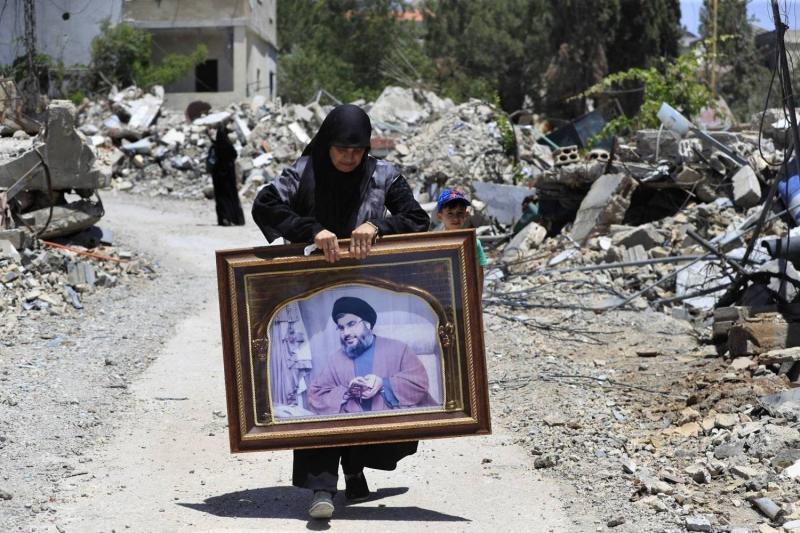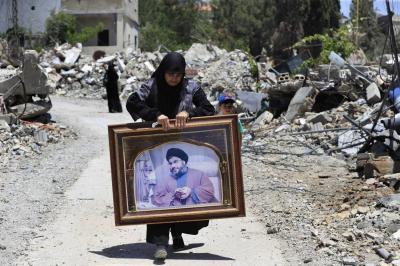After about six months since the first meeting between the Deputy Director of the German Intelligence, Ole Dial, and Deputy Secretary-General of Hezbollah, Sheikh Naim Qassem, Dial returned to Beirut to continue what he started and meet Qassem again last Saturday evening. He spent a few hours in Lebanon with his team before departing for Berlin the following Sunday morning without meeting any Lebanese officials. While both parties declined to comment on the meeting or confirm its authenticity, the website "Lebanon Private Gate" reported on its account on platform X that a plane used as a cover for the German Federal Intelligence (BND) landed at Beirut International Airport for a few hours on Saturday-Sunday night before returning to Germany.
Sources familiar with the atmosphere of Dial and Qassem's meeting, attended by the head of the German intelligence station in Beirut, affirm that "the atmosphere of the session was positive," during which both sides presented their viewpoints regarding current events in the region, the conflict in Gaza, and southern Lebanon. The sources confirmed that Dial did not carry any threatening messages as is customary with Western envoys in their meetings with Lebanese officials, nor did he bring any comprehensive initiative. Instead, he came to continue the first meeting directly and follow up on what German Foreign Minister Annalena Baerbock initiated during her recent visit to Beirut with Lebanese officials, albeit "indirectly."
According to the information, the visit of the German envoy was exploratory to complement Baerbock's inquiries about what could be done in southern Lebanon to avoid an all-out war. The Germans presented the viewpoint that the Israeli enemy aims to return the settlers displaced from northern occupied Palestine due to resistance strikes, threatening an all-out war to achieve this goal, and that any unintended mistake from either side during the violent exchange of fire could lead to a comprehensive confrontation, asking how to avoid large-scale escalation.
Qassem's response did not differ from the declared resistance stance or from his position in the previous meeting in January, where he reiterated that any discussion about a ceasefire in the south is linked to a ceasefire accepted by the Palestinian resistance in Gaza. He stressed that Western countries, if they fear the outbreak of a major war, should exert pressure on Israel to stop its war on Gaza, and only then could there be discussions regarding the support front in the south. According to the sources, Qassem affirmed to the German envoy that the enemy's threat of an all-out war does not intimidate the resistance, which is strong and prepared, and what it has demonstrated in terms of resilience is what prevents war on Lebanon.
Qassem also inquired with the Germans about Lebanese citizens who have been arrested in Germany on charges related to membership or working for Hezbollah, to which Dial confirmed that the issue of the detainees is in the hands of the judiciary and not within the files of German intelligence. While Hezbollah denies any connection of the arrested Lebanese citizens to its activities following the decision to ban Hezbollah's activities on German soil, it can be understood from the German judiciary's decision to issue two verdicts so far against detainees accused by Berlin of working on behalf of Hezbollah, that it is part of dismantling the file between Berlin and Haret Hreik, as the sentences imply that the release of the detainees is imminent after serving part of their sentences.
The Germans' eagerness to attempt to calm the southern front and avoid an all-out war through direct communication with the resistance indicates that major Western countries, including those involved in blind support for Israel, such as Germany, have begun to recognize the seriousness of the potential for such a war and the capabilities the resistance possesses in facing and expanding the fire's reach. The insistence of the Germans on raising the level of communication with Hezbollah reflects Berlin's conviction that playing a proactive role on the eastern shore of the Mediterranean requires different approaches in foreign policy than those adopted in the past decade, especially in the context of seeking a previous intermediary role that communicates directly with all parties concerned without severing ties and emotional stances.
The development of German communication with Hezbollah from purely security channels to political engagement—evident in the recent meetings between Dial and Qassem, or through occasional meetings between representatives of the German embassy in Beirut and Hezbollah representatives—also fits within the realm of political communication and exchange of views to bridge perspectives.
Although Berlin continues to announce strict positions toward the Syrian government, the completion of the circle of influence for Berlin, particularly with the unprecedented tension in German-Iranian relations, is lacking a return to direct communication with Damascus, which refuses to limit contact to security issues without elevating discussions to a political level. As the Germans increasingly affirm day by day that their policy of "denial" regarding Syria does not resolve shared crises, the expectation of Berlin stepping down from the Syrian crisis may not take long, especially after the Arab isolation of Damascus has fractured, and all southern European countries are demanding the restoration of relations with Syria.




